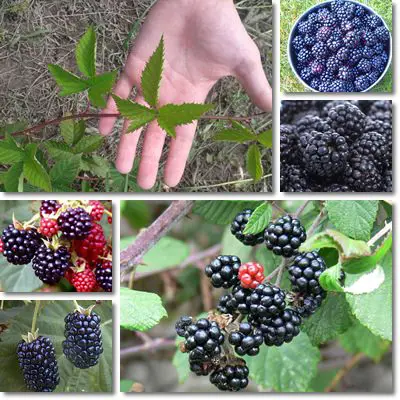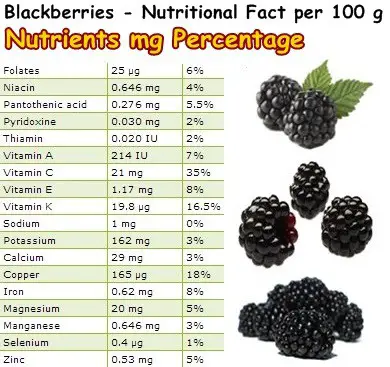For some time now, blackberries, plants of the Rubus genus, Rosaceae family, are being cultivated worldwide for commercial purposes.
Although in the United Kingdom, North America and Australia they have spread so aggressively that they are presently considered a modern weed, numerous scientific studies assert the incredible properties and health benefits of their fruits, also known as blackberries.
Rich in vitamins C and K, copper and antioxidant anthocyanins and a modest source of dietary iron, zinc, vitamin A and B vitamins, blackberries have anti-aging and anti-inflammatory properties and hold benefits for the cardiovascular, nervous, digestive and immune systems.

With an overwhelming presence powered by an invasive nature that has lead to a rapid adaptation to and naturalization in different climates around the world, blackberries have come to be a prime choice of fruit and adapted to numerous dishes from across the most diverse of cultures. There is an almost uninterrupted abundance in the seasonal supply of the berry across American, European and Asian countries where it is cultivated extensively which has made it easier for fresh stocks of blackberries to be readily available everywhere, from supermarkets to small local markets.
Availability paired with a pleasant taste and backed up by the knowledge of the health benefits of eating blackberries encourage the consumption of the fruit on a large scale.
Eating fruit, especially dark colored berries such as blackberries, is undoubtedly one of the best ways to get all the range of essential vitamins and minerals you need every day and enjoy wonderful benefits for health as a result. And blackberries offer up many benefits!
What do blackberries look like?
Blackberries look a lot like black raspberries in the sense that they are rounded and made up of dozens of tiny, plump and juicy droplets of fruit. Initially a pale green color, as they ripen, blackberries turn a dull red and ultimately dark blue-black color which is the source of their very descriptive common name.
What is the difference between blackberries and black raspberries?
The biggest difference between blackberries and black raspberries that will help you easily tell apart the two fruit is the fact that, in blackberries, the receptacle stays with the blackberry when you pick it off the plant. Vs blackberries, in black raspberries, the receptacle stays on the plant leaving the raspberry empty inside. The receptacle is the fleshy, light green piece of fruit inside the actual blackberry.
What do blackberries taste like?
Blackberries are soft and full of juice, with a refreshing sweet taste of mild intensity and pleasant, mellow tart flavors complimented by a slight bitter aftertaste. As they come into season and ripen, the berries turn a very dark blue-black color and develop sweet and tart fruity flavors in response to plentiful sunlight exposure.
Blackberries appeal to a great number of people due to their unique flavor profile, although there are those who find the seeds inconvenient and may choose to exclude the fruit from their diet altogether for exactly this reason. However, don’t let yourself be put off by the seeds because blackberries are truly delightful and nutritious fruit, full of benefits for health and an ideal option to add balance and variety to your diet.
Blackberries: main uses
What do you do with blackberries? You can eat the fresh berries as they are, out of hand. You can add fresh blackberries to fruit salads, smoothies or mixed salads with leafy greens, aged cheeses and nuts and seeds. Consider blackberries as a healthy topping for morning cereal, yogurt, and any number of breakfast options from crepes and pancakes to waffles, toast and oatmeal.
Blackberry jam, jelly, wine and blackberry pie taste heavenly and are a must-try considering their delightful sweet-tart taste and rich flavor profile. Seen they are full of antioxidants and contain a range of essential nutrients, it would be a great shame not to take advantage of the amazing benefits for health that come with eating blackberries.

When is blackberry season?
Blackberries are a seasonal summer fruit and are available in summer months. In the Northern hemisphere, blackberries are naturally in season July to September at the latest. However, regional differences in climate and yearly weather variations, as well as microclimate replication in closed environments such as greenhouses can shift blackberry season and even extend it by up to two months, providing a stable both early and late season supply.
Nutrition facts and health benefits
Digestive benefits and benefits for weight loss
The berries are a rich source of dietary fiber, indigestible plant material with several excellent benefits for digestive health. Getting enough fiber in your diet helps prevent and relive constipation by adding bulk to stools as well as softening stools for more regular bowel movements that are easy to pass.
Not just this, but dietary fiber is the secret to healthy, controlled weight-loss. What’s interesting about blackberries is they contain both soluble and insoluble fiber material, that is, fiber that both passes through the digestive tract utterly unprocessed and fiber that jellifies and ferments, contributing to gut flora nutrition.
Studies link a sufficient daily intake of dietary fiber to a reduction in the risk of developing colon cancer. This benefit is attributed to the positive effects of fermentable dietary fiber on gut flora populations. With a prebiotic action, dietary fiber in blackberries nourishes beneficial gut bacteria and other flora and helps grow populations for a healthy digestive environment and good bowel health.
Good for high cholesterol
The consumption of foods rich in dietary fiber has proved effective in reducing levels of total and LDL cholesterol, dubbed bad cholesterol, with benefits for cardiovascular health. Dietary fiber regulates the absorption of fat in the GI tract as well as provides satiety, helping with weight control, both of which indirectly hold benefits for high cholesterol.
High in antioxidants that combat cell damage
Blackberries have an incredible antioxidant value. An analysis of their phytochemical content reveals they contain anthocyanins, the antioxidant pigments responsible for their beautiful, intense dark colour, ellagic acid, tannins, quercetin, gallic acid, cyanidin, pelargonidin, catechin, kaempferol and salicylic acid, among other constituents with antioxidant properties.
The majority of the compounds listed are extremely potent natural antioxidants with a range of benefits for health. Antioxidants in blackberries scavenge harmful free radical molecules and help prevent, limit and repair cell damage produced by them. The antioxidant activities of foods are linked to reduced prevalence of cancer, diabetes and cardiovascular disease.
Salicylic acid from blackberries is a strong anti-inflammatory agent, and it’s the same compound from which aspirin (acetylsalicylic acid) is derived.
The uses of aspirin usually include pain relief for all sorts of pains and aches, fever reduction on top of a wide range of uses for various skin problems.
It’s not far fetched to assume that foods that naturally contain salicylic acid, such as blackberries, have some degree of anti-inflammatory properties as a result of the presence of the compound.
In traditional medicinal systems, foods containing salicylic acid were often sought for their pain-relieving, anticoagulant and fever-reducing properties. In any case, the fact that blackberries are full of antioxidants alone makes them a great addition to any diet.

Anti-inflammatory and antiaging benefits
Another reason why blackberries are so incredibly healthy is they have a very good content of vitamin C. How much vitamin C in blackberries? A serving of just 100 grams of the fruit provides over 23% of total daily vitamin C values for the average adult.
Vitamin C is a powerful water-soluble antioxidant, recognized for its many therapeutic effects. For one, vitamin C is a potent anti-inflammatory and antimicrobial agent.
Studies show it is actively involved in lowering levels of inflammation in the body and counteracts infection by promoting wound healing and enhancing the immune system function.
Vitamin C is also the prerequisite for collagen synthesis. Collagen is the main structural protein in our body and is essential for maintaining the structure and integrity of blood vessels, bones, connective tissue such as tendons and organs such as the skin. By stimulating the production of collagen, vitamin C from foods such as blackberries contributes to skin elasticity with an antiaging action.
Enhance the immune system response
The good content of vitamin C in blackberries makes them a good food for immune system support. Vitamin C boosts the immune system via specific modulatory effects, namely enhancing the activity of white blood cells such as T cells and stimulating faster wound healing.
Benefits for skin health
Just 100 grams of blackberries can get you 7.8% of daily vitamin E values and pigmented carotenoid antioxidants with and without vitamin A activity such as beta-carotene, alpha-carotene, lutein and zeaxanthin. The good levels of vitamin E and carotenoid antioxidants hold important benefits for skin health.
Vitamin E contributes to maintaining the lipid barrier of skin cell membranes and exerts a photoprotective action. Carotenes with vitamin A activity have regenerative and reparative effects as vitamin A is involved in skin cell turnover, while carotenes without vitamin A activity hold antioxidant benefits and counteract free radical damage to skin cells.
Antibleeding effects
Blackberries have good levels of vitamin K recognized for its antibleeding action. Vitamin K plays a crucial role in the process of blood coagulation, helping stop bleeding by initiating blood coagulation processes.
Benefits for bone density and anti-atherosclerotic action
The good content of vitamin K in blackberries is a source of benefits for bone density and cardiovascular health. Vitamin K regulates calcium metabolism, directing calcium from the diet into bones and teeth, contributing to good bone mineral density and bone and teeth strength.
Not just this, but its regulatory action on calcium metabolism is further a source of anti-atherosclerotic benefits.
Atherosclerosis is a disease of the cardiovascular system that causes calcium-containing plaque deposits on the inside of artery walls.
The plaque deposits restrict blood flow and increase risks of cardiovascular events such as stroke. Getting enough vitamin K in the diet exerts an anti-atherosclerotic action with benefits for cardiovascular health.
Good for energy metabolism and boosting vitality
Another reason why blackberries are great for health is their varied B vitamin content. Niacin, riboflavin, pantothenic acid, folate and pyridoxine help the body metabolize macronutrients such as carbohydrates and ensure the resulting energy is properly distributed throughout our body for elevated energy levels.
The good content of vitamin B9 in particular (6% of daily values) together with small amounts of iron (close to 3.5% of daily values) impart anti-anemia benefits to blackberries and combat tiredness and fatigue.
But the biggest and most noticeable benefits for energy metabolism stem from the modest sugar content of the fruit (5 grams of sugar for 100 grams of berries). The natural sugars in blackberries raise levels of sugar in the blood and provide quick energy for the body to use, exerting a revitalizing effect.
Minor antihypertensive benefits
Just 100 grams of blackberries gets you 3.4% of daily potassium and 4.7% of daily magnesium values. Potassium and magnesium regulate blood pressure and heart contractions, helping lower high blood pressure numbers and combat arrhythmia and palpitations.
As far as other dietary minerals are concerned, the delicious berries list small amounts of zinc, iron, manganese, copper and calcium. While calcium contributes modestly to bone density, copper is essential for the production of both white and red blood cells and has antiaging benefits (e.g. combats premature hair graying).
Benefits for bone density
Eating blackberries is good for bones and teeth. For one, the berries have small amounts of calcium and magnesium to physically build bones and teeth, and good amounts of vitamin K to improve bone density via a regulatory action of calcium metabolism.
The biggest benefits of blackberries for bones and teeth are derived from their content of vitamin C. Vitamin C stimulates the production of collagen types one and three needed to maintain bone structure. Just as important, vitamin C in blackberries supports the functions of osteoblasts, cells that make new bone tissue, helping remodel bones to be stronger. See more vitamins you need for strong bones and teeth.
Vitamin C also keeps gums healthy, prevents bleeding from gums and helps gums better adhere to teeth, reducing risks of tooth loss. Blackberries also contain a so-called natural sugar alcohol, xylitol, used to substitute regular sugar in sweets. Xylitol has been revealed to have important antibacterial effects, protecting teeth from cavities by reducing the numbers of specific cavity-causing bacteria in the mouth. Fresh and savory, the fruit are an excellent summer snack and, to be honest, ridiculously healthy.
